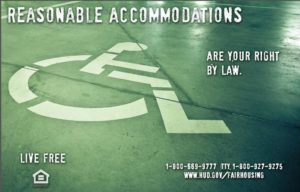Many apartment complexes have “first-come, first-served” parking policies. And, to most, such policies seem reasonable. These policies do not on their face treat anyone differently: whoever gets to the space first gets to park there. And if there are no parking spaces available, or if the only available space is far from a person’s residence, everyone just has to wait his or her turn. Seems fair, right?
But what about the tenant who has a disability that affects her ability to stand and walk? Who, for instance, has a disability that causes her to lose feelings in her feet and legs? Her walk from a parking space on the other side of the lot to her residence is not the same walk for the person without a disability; what is a mere inconvenience for the person without this disability may in fact be scary and dangerous for the person with this disability. The Fair Housing Act recognizes this difference, and, as a way of leveling the playing field, allows for the tenant with such a disability to request a reserved parking space closest to her residence as a reasonable accommodation of that “first-come, first-served” parking policy.

That is exactly what Ms. Jerilyne Johnson did in 2014, when she requested to have a reserved parking space near her residence to accommodate her mobility limitations, some of which were caused by multiple sclerosis (MS). After receiving a denial of this request, Ms. Johnson filed a fair housing administrative complaint with the U.S. Department of Housing and Urban Development (HUD) against the owners and managers of the housing complex Villas at Northview.
The complaint was later referred by HUD to the North Carolina Human Relations Commission (NCHRC) for investigation. Although Ms. Johnson’s request for a reserved parking space was eventually granted, she had to wait over a year to obtain it, and the NCHRC found this delay to constitute “reasonable cause” to believe that her rights under the Fair Housing Act were violated.
Legal Aid of North Carolina’s Fair Housing Project represented Ms. Johnson in settlement negotiations that ultimately resolved the case. Although they denied engaging in any discrimination, the owners and managers of the complex agreed to pay a total of $15,000 in damages to Ms. Johnson. The complex also adopted new policies for future requests by people with disabilities and will train their staff in fair housing law. To read the press release announcing the settlement click here.
What may seem fair and reasonable at first glance can, in fact, deny a tenant of his or her equal opportunity to use and enjoy their residence and surrounding amenities. Ms. Johnson’s case underscores this protection guaranteed by the Fair Housing Act.
More from this Newsletter Issue: Spring 2018
Subscribe to the Newsletter
